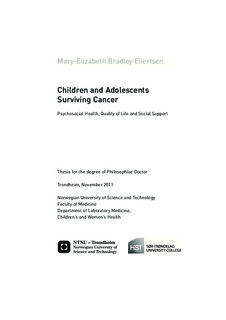| dc.contributor.author | Eilertsen, Mary-Elizabeth Bradley | nb_NO |
| dc.date.accessioned | 2014-12-19T14:19:38Z | |
| dc.date.available | 2014-12-19T14:19:38Z | |
| dc.date.created | 2012-01-12 | nb_NO |
| dc.date.issued | 2011 | nb_NO |
| dc.identifier | 476661 | nb_NO |
| dc.identifier.isbn | 978-82-471-3125-1 (printed ver.) | nb_NO |
| dc.identifier.isbn | 978-82-471-3126-8 (electronic ver.) | nb_NO |
| dc.identifier.uri | http://hdl.handle.net/11250/263844 | |
| dc.description.abstract | Children and Adolescents Surviving Cancer: Psychosocial Health, Quality of Life and Social Support
Background: Childhood cancer involves a crisis for the child and their family where they face many challenges to achieve normality after diagnosis, even after successful treatment. In 1985, a professional collaboration model (PCM) was developed at the Department of Pediatrics, St. Olavs University Hospital, Trondheim where the goal was to offer optimal follow-up care to children with cancer and their families.
Aim: The aim of this two part study (part 1 and 2) was to explore social support, psychosocial health and quality of life (QoL) for children and adolescents surviving cancer. The specific aim of part 1 was to explore and describe social support in view of professionals’ perception of collaboration. An additional aim was to evaluate the PCM in Central Norway taken into consideration the need to further develop and ensure the quality of supportive interventions necessary for rehabilitation for childhood cancer survivors. In part 2 the specific aim was to explore and describe psychosocial health and QoL of children and adolescents surviving cancer at least 3 years after their cancer diagnosis, compared with a healthy control group.
Material and Methods: Health and non-health professionals from the families’ home communities caring for children treated at the Department of Pediatrics, St. Olavs University Hospital in Trondheim, Norway between 1990 and 1996 were invited to participate in part 1 of this study. Ninety-one of 142 eligible professionals (64%) responded to a questionnaire and 17 of these professionals participated in focus group interviews. Part 2 was a case-control study including 50 children and adolescents diagnosed with cancer between January 1, 1993 – January 1, 2003. Data was collected by using the Strengths and Difficulties Questionnaire (SDQ) (self-report, parent report and teacher report), the competence scales of Achenbach System of Empirically Based Assessment questionnaire (ASEBA) (teacher report), the Inventory of Life Quality in Children and Adolescents (ILC) and the KINDL QoL questionnaires (self-report and parent report), as well as by collecting data for any somatic late effects and psychological problems from the medical records of children surviving cancer.
Results: Professionals in part 1 stated that collaboration enables professionals to make use of each other’s knowledge and resources thus, giving better follow-up care for children and their families. However, professionals also stated that collaboration is dependent on well-established routines and structure. Moreover, professionals stated that the PCM is a valuable method for follow-up care for children with cancer and their families. In part 2 of our study, children and adolescents surviving cancer had generally more emotional problems when compared to their peers. However, adolescents surviving cancer as a group assessed their QoL as similar to that of their peers. Yet, adolescents surviving brain tumours or those with late effects reported more emotional problems and lower QoL and an increased number of QoL domains perceived as problematic, even many years after diagnosis and treatment. Parents generally reported more emotional problems and a poorer QoL for their children surviving cancer, as well as an increased number of QoL domains experienced as problematic compared with parent controls.
Discussion and Conclusion: To improve the child’s psychosocial health and QoL our results indicate the need to develop pertinent and adequate supportive interventions and programs when planning and implementing long-term follow-up care and rehabilitation of children and adolescents surviving cancer, especially for survivors with brain tumours, and those with late effects. Our results also indicate the need to take into account subjectively perceived and proxy reported psychosocial health and QoL for children surviving cancer. To offer the necessary guidance, support, and assistance, is the understanding of how cancer is experienced by both children and their families important in the practice of pediatric oncology; for nurses, medical doctors and other professionals in the collaborative team.
. | nb_NO |
| dc.language | eng | nb_NO |
| dc.publisher | Norges teknisk-naturvitenskapelige universitet, Det medisinske fakultet, Institutt for laboratoriemedisin, barne- og kvinnesykdommer | nb_NO |
| dc.relation.ispartofseries | Doktoravhandlinger ved NTNU, 1503-8181; 2011:278 | nb_NO |
| dc.relation.ispartofseries | Dissertations at the Faculty of Medicine, 0805-7680; 516 | nb_NO |
| dc.relation.haspart | Eilertsen, M E B; Reinfjell, T; Vik, T. Value of professional collaboration in the care of children with cancer and their families. European Journal of Cancer Care. (ISSN 0961-5423). 13(4): 349-355, 2004. <a href='http://dx.doi.org/10.1111/j.1365-2354.2004.00496.x'>10.1111/j.1365-2354.2004.00496.x</a>. | nb_NO |
| dc.relation.haspart | Bradley Eilertsen, Mary-Elizabeth; Kristiansen, Kristjana; Reinfjell, Trude; Rannestad, Toril; Indredavik, Marit S; Vik, Torstein. Professional collaboration - support for children with cancer and their families - focus group interview - a source of information and knowledge - professionals' perspectives.. Journal of Interprofessional Care. (ISSN 1356-1820). 23(4): 355-68, 2009. <a href='http://dx.doi.org/10.1080/13561820902881726'>10.1080/13561820902881726</a>. <a href='http://www.ncbi.nlm.nih.gov/pubmed/19370468'>19370468</a>. | nb_NO |
| dc.relation.haspart | Eilertsen, Mary-Elizabeth Bradley; Rannestad, Tori; Indredavik, Marit S.; Vik, Torstein. PSYCHOSOCIAL HEALTH IN CHILDREN AND ADOLESCENTS SURVIVING CANCER. Scandinavian Journal of Caring Sciences. (ISSN 0283-9318). 25(4): 725-734, 2011. <a href='http://dx.doi.org/10.1111/j.1471-6712.2011.00883.x'>10.1111/j.1471-6712.2011.00883.x</a>. | nb_NO |
| dc.relation.haspart | Bradley Eilertsen, Mary-Elizabeth; Jozefiak, Thomas; Rannestad, Toril; Indredavik, Marit S; Vik, Torstein. Quality of life in children and adolescents surviving cancer.. European Journal of Oncology Nursing. (ISSN 1462-3889), 2011. <a href='http://dx.doi.org/10.1016/j.ejon.2011.08.001'>10.1016/j.ejon.2011.08.001</a>. <a href='http://www.ncbi.nlm.nih.gov/pubmed/21945190'>21945190</a>. | nb_NO |
| dc.title | Children and Adolescents Surviving Cancer: Psychosocial Health, Quality of Life and Social Support | nb_NO |
| dc.type | Doctoral thesis | nb_NO |
| dc.contributor.department | Norges teknisk-naturvitenskapelige universitet, Det medisinske fakultet, Institutt for laboratoriemedisin, barne- og kvinnesykdommer | nb_NO |
| dc.description.degree | Dr.philos. | nb_NO |
| dc.description.degree | Dr.philos. | en_GB |

